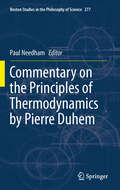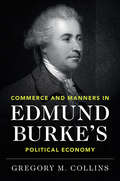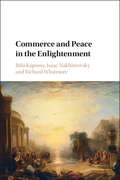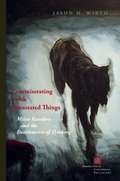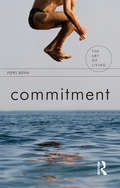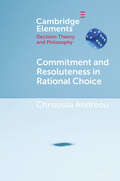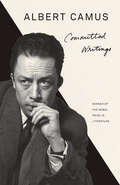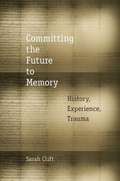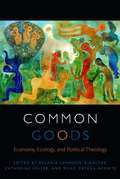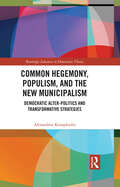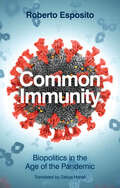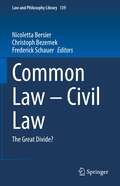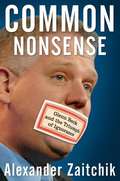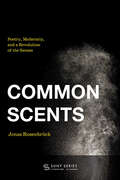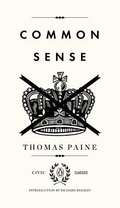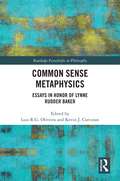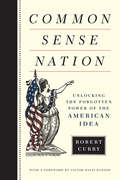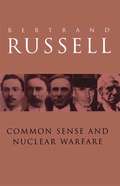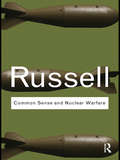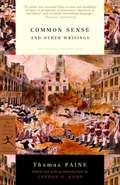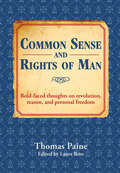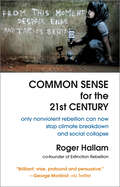- Table View
- List View
Commentary on the Principles of Thermodynamics by Pierre Duhem (Boston Studies in the Philosophy and History of Science #277)
by Paul NeedhamPierre Duhem (1861-1916) held the chair of theoretical physics at Bordeaux from 1894 to his death. He established a reputation in both the history and philosophy of science as well as in science itself (physics and physical chemistry). Much of his work in the first two areas has been translated into English, but little of his technical scientific work. The present volume contains early work of Duhem's illustrating his interest in the rigorous development of physical theory for which he is famous. It opens with what was the first critical discussion of Gibbs' groundbreaking "On the Equilibrium of Heterogeneous Substances" (1876-8), where Duhem addressed the problem that, as he put it, "Mathematicians regret that the principles of Thermodynamics should have been developed in general with so little precision that the same proposition can be regarded by some as a consequence, and by others as a negation, of these principles". The other papers, forming a three-part series, pursue this project of putting the foundations of thermodynamics on a clearer and more secure basis. This book will be of interest to scholars in history and philosophy of science, especially those interested in the development of physical chemistry and the work of Pierre Duhem.
Commerce and Manners in Edmund Burke's Political Economy
by Gregory M. CollinsAlthough many of Edmund Burke's speeches and writings contain prominent economic dimensions, his economic thought seldom receives the attention it warrants. Commerce and Manners in Edmund Burke's Political Economy stands as the most comprehensive study to date of this fascinating subject. In addition to providing rigorous textual analysis, Collins unearths previously unpublished manuscripts and employs empirical data to paint a rich historical and theoretical context for Burke's economic beliefs. Collins integrates Burke's reflections on trade, taxation, and revenue within his understanding of the limits of reason and his broader conception of empire. Such reflections demonstrate the ways that commerce, if properly managed, could be an instrument for both public prosperity and imperial prestige. More importantly, Commerce and Manners in Edmund Burke's Political Economy raises timely ethical questions about capitalism and its limits. In Burke's judgment, civilizations cannot endure on transactional exchange alone, and markets require ethical preconditions. There is a grace to life that cannot be bought.
Commerce and Peace in the Enlightenment
by Isaac Nakhimovsky Richard Whatmore Béla KapossyFor many Enlightenment thinkers, discerning the relationship between commerce and peace was the central issue of modern politics. The logic of commerce seemed to require European states and empires to learn how to behave in more peaceful, self-limiting ways. However, as the fate of nations came to depend on the flux of markets, it became difficult to see how their race for prosperity could ever be fully disentangled from their struggle for power. On the contrary, it became easy to see how this entanglement could produce catastrophic results. This volume showcases the variety and the depth of approaches to economic rivalry and the rise of public finance that characterized Enlightenment discussions of international politics. It presents a fundamental reassessment of these debates about 'perpetual peace' and their legacy in the history of political thought.
Commiserating with Devastated Things: Milan Kundera and the Entitlements of Thinking (Perspectives in Continental Philosophy)
by Jason M. WirthCommiserating with Devastated Things seeks to understand the place Milan Kundera calls “the universe of the novel.” Working through Kundera’s oeuvre as well as the continental philosophical tradition, Wirth argues that Kundera transforms—not applies—philosophical reflection within literature.Reading between Kundera’s work and his self-avowed tradition, from Kafka to Hermann Broch, Wirth asks what it might mean to insist that philosophy does not have a monopoly on wisdom, that the novel has its own modes of wisdom that challenge philosophy’s.
Commitment (The Art of Living)
by Piers BennMost of us care about certain people and things, and some of these concerns become personal commitments, involving our values, our relationships, our work and our religious or political stances. But what is commitement, and why should it matter? Is social commitment - for example, to the family - being eroded by individualism or ironic detachment? And how should we deal with the potential tension between devotion to a life-stance, and the doubts prompted by pursuit of rational integrity? In this work, Piers Benn delves into the relationship between commitment and meaningful life, and asks whether commitment must be based on truth to provide such meaning. He also explores obstacles to commitment such as boredom, sloth and indifference. Drawing on his own experience of dithering and procrastination, he suggests that a sceptical, cautious attitude to important matters can be both a virtue and a real obstacle to human fulfillment.
Commitment and Resoluteness in Rational Choice (Elements in Decision Theory and Philosophy)
by Chrisoula AndreouDrawing and building on the existing literature, this Element explores the interesting and challenging philosophical terrain where issues regarding cooperation, commitment, and control intersect. Section 1 discusses interpersonal and intrapersonal Prisoner's Dilemma situations, and the possibility of a set of unrestrained choices adding up in a way that is problematic relative to the concerns of the choosers involved. Section 2 focuses on the role of precommitment devices in rational choice. Section 3 considers the role of resoluteness in rational choice and action. And Section 4 delves into some related complications concerning the nature of actions and the nature of intentions.
Committed Writings (Penguin Modern Classics Ser.)
by Albert CamusThe Nobel Prize winner's most influential and enduring political writings, newly curated and introduced by acclaimed Camus scholar Alice Kaplan.Albert Camus (1913-1960) is unsurpassed among writers for a body of work that animates the wonder and absurdity of existence. Committed Writings brings together, for the first time, thematically-linked essays from across Camus's writing career that reflect the scope of his political thought. This pivotal collection embodies Camus's radical and unwavering commitment to upholding human rights, resisting fascism, and creating art in the service of justice.
Committing the Future to Memory: History, Experience, Trauma
by Sarah CliftWhereas historical determinacy conceives the past as a complex and unstable network of causalities, this book asks how history can be related to a more radical future. To pose that question, it does not reject determinacy outright but rather seeks to explore how it works. In examining what it means to be “determined” by history, it also asks what kind of openings there might be in our encounters with history for interruptions, re-readings, and re-writings.Engaging texts spanning multiple genres and several centuries—from John Locke to Maurice Blanchot, from Hegel to Benjamin—Clift looks at experiences of time that exceed the historical narration of experiences said to have occurred in time. She focuses on the co-existence of multiple temporalities and opens up the quintessentially modern notion of historical succession to other possibilities. The alternatives she draws out include the mediations of language and narration, temporal leaps, oscillations and blockages, and the role played by contingency in representation. She argues that such alternatives compel us to reassess the ways we understand history and identity in a traumatic, or indeed in a post-traumatic, age.
Common Good and Self-Interest in Medieval and Early Modern Philosophy (The New Synthese Historical Library #78)
by Heikki Haara Juhana ToivanenThis open access volume provides an in-depth analysis of philosophical discussions concerning the common good and its relation to self-interest in the history of Western philosophy. The thirteen chapters explore both renowned and lesser-known thinkers from the Middle Ages to the eighteenth century, covering also the relevant ancient background. By bridging the gap between the medieval and early modern periods, they provide fresh insights into how moral and political philosophers understood the concepts of the common good and self-interest, along with their ethical and political implications. The concept of the common good occupies a central role in philosophical reflections on the public and private dimensions of moral and social life in contemporary debates. By exploring the rich and diverse ways in which the relationship between the common good and self-interest has been understood, this volume has the potential to contribute to our ongoing efforts to critically discern the possibilities and limitations of these concepts in the present. Thus, the volume will be useful for scholars interested in the multi-layered role of the notion of the common good both in the history of philosophy and in contemporary moral and political philosophy.
Common Goods: Economy, Ecology, and Political Theology (Transdisciplinary Theological Colloquia)
by Melanie Johnson-DeBaufre, Catherine Keller, and Elias Ortega-AponteIn the face of globalized ecological and economic crises, how do religion, the postsecular, and political theology reconfigure political theory and practice? As the planet warms and the chasm widens between the 1 percent and the global 99, what thinking may yet energize new alliances between religious and irreligious constituencies?This book brings together political theorists, philosophers, theologians, and scholars of religion to open discursive and material spaces in which to shape a vibrant planetary commons. Attentive to the universalizing tendencies of “the common,” the contributors seek to reappropriate the term in response to the corporate logic that asserts itself as a universal solvent. In the resulting conversation, the common returns as an interlinked manifold, under the ethos of its multitudes and the ecology of its multiplicity.Beginning from what William Connolly calls the palpable “fragility of things,” Common Goods assembles a transdisciplinary political theology of the Earth. With a nuance missing from both atheist and orthodox religious approaches, the contributors engage in a multivocal conversation about sovereignty, capital, ecology, and civil society. The result is an unprecedented thematic assemblage of cosmopolitics and religious diversity; of utopian space and the time of insurrection; of Christian socialism, radical democracy, and disability theory; of quantum entanglement and planetarity; of theology fleshly and political.
Common Hegemony, Populism, and the New Municipalism: Democratic Alter-Politics and Transformative Strategies (Routledge Advances in Democratic Theory)
by Alexandros KioupkiolisCommon Hegemony, Populism, and the New Municipalism critically explores the global rise of an alternative democratic politics since the 1990s in both practice and theory, from the Zapatistas’ insurrection to the 2011 cycle of democratic contestation and the ensuing municipalist movement in Spain. Staging an alternative to mainstream politics in both its statist and its activist variants, Alexandros Kioupkiolis combines a comprehensive and in-depth account of contemporary alter-politics with an extensive treatment of strategic challenges and broaches the question of strategy through theories of hegemony which are revisited and renewed by taking our lead from contemporary social movements and practices. Specific movements such as 15-M, and new municipalism, are examined to understand how these have transfigured the counter-hegemonic politics in the direction of egalitarianism, diversity, and grassroots self-government. Common Hegemony, Populism, and the New Municipalism will be of interest to researchers and students of contemporary political theory, democratic theory, and social movement studies.
Common Immunity: Biopolitics in the Age of the Pandemic
by Roberto EspositoAfter two years of global pandemic, it is no surprise that immunization is now at the center of our experience. From the medicalization of politics to the disciplining of individuals, from lockdowns to mass vaccination programs, contemporary societies seem to be firmly embedded in a syndrome of immunity. To understand the ambivalent effects of this development, it is necessary to go back to its modern genesis, when the languages of law, politics, and medicine began to merge into the biopolitical regime we have been living under for some time. This regime places a high priority on immunization and security: no security is more important than health security. The Covid-19 pandemic has taken the dynamic of immunization to a new level: for the first time in history, we see societies seeking to achieve generalized immunity in their entire populations through vaccination. This allows us to glimpse the possibility of a “common immunity” that strengthens the relation between community and immunity. The dramatic tensions we have experienced in recent years between security and freedom, norm and exception, power and existence, all refer to the complex relationship between community and immunity, the decisive features of which are reconstructed in this book. Building on the prescient argument originally developed two decades ago in Immunitas, Roberto Esposito demonstrates in this new book how the pandemic and our responses to it have brought into sharp relief the fundamental biopolitical conditions of our contemporary societies.
Common Law – Civil Law: The Great Divide? (Law and Philosophy Library #139)
by Frederick Schauer Christoph Bezemek Nicoletta BersierThis book offers an in-depth analysis of the differences between common law and civil law systems from various theoretical perspectives. Written by a global network of experts, it explores the topic against the background of a variety of legal traditions.Common law and civil law are typically presented as antagonistic players on a field claimed by diverse legal systems: the former being based on precedent set by judges in deciding cases before them; the latter being founded on a set of rules intended to govern the decisions of those applying them. Perceived in this manner, common law and civil law differ in terms of the (main) source(s) of law; who is to create them; who is (merely) to draw from them; and whether the law itself is pure each step of the way, or whether the law’s purity may be tarnished when confronted with a set of contingent facts. These differences have deep roots in (legal) history – roots that allow us to trace them back to distinct traditions. Nevertheless, it is questionable whether the divide thus depicted is as great as it may seem: international and supranational legal systems unconcerned by national peculiarities appear to level the playing field. A normative understanding of constitutions seems to grant ever-greater authority to High Court decisions based on thinly worded maxims in countries that adhere to the civil law tradition. The challenges contemporary regulation faces call for ever-more detailed statutes governing the decisions of judges in the common law tradition. These and similar observations demand a structural reassessment of the role of judges, the power of precedent, the limits of legislation and other features often thought to be so different in common and civil law systems. The book addresses this reassessment.
Common Nonsense: Glenn Beck and the Triumph of Ignorance
by Alexander ZaitchikWho is this guy and why are people listening? Forget Rush Limbaugh, Bill O'Reilly, and Sean Hannity--Glenn Beck is the right's new media darling and the unofficial leader of the conservative grassroots. Lampooned by the left and lionized by the far right, his bluster-and-tears brand of political commentary has commandeered attention on both sides of the aisle. Glenn Beck has emerged over the last decade as a unique and bizarre conservative icon for the new century. He fantasizes aloud about killing his political opponents and encourages his listeners to embrace a cynical paranoia that slides easily into a fantasyland filled with enemies that do not exist, and solutions that are incoherent, at best. Since the election of Barack Obama, Beck's bombastic, conspiratorial, and often viciously personal approach to political combat has made him one of the most controversial figures in the history of American broadcasting. In Common Nonsense, investigative reporter Alexander Zaitchik explores Beck's strange brew of ratings lust, boundless ego, conspiratorial hard-right politics, and gimmicky morning-radio entertainment chops. Separates the facts from the fiction, following Beck from his troubled childhood to his recent rise to the top of the conservative media heap. Zaitchik's recent three-part series in Salon caused so much buzz, Beck felt the need to attack it on his show. Based on Zaitchik's interviews with former Beck coworkers and review of countless Beck writings and television and radio shows. Examines Beck's high-profile obsessions (Acorn and Van Jones) as well as his lesser-known influences (obscure Mormon radicals like Cleon Skousen.) Zaitchik's writing has appeared in the New Republic, the Nation, Salon, Wired, the New York Times, and AlternetBeck, a perverse and high-impact media spectacle, has emerged as a leader in a conservative protest movement that raises troubling questions about the health of American democracy.
Common Scents: Poetry, Modernity, and a Revolution of the Senses (SUNY series, Literature . . . in Theory)
by Jonas RosenbrückThe sense of smell has long been the most neglected of the human senses in literature. Common Scents sets out to undo this forgetting of olfactory sense-making by tracing the appearance of odors in modern German and French poetry. Jonas Rosenbrück argues that smell's persistence undermines modernity's self-image as an ocular age and shows how scents index a veritable "revolution of the senses." Such a revolution, as a redistribution of the senses, would make the common and shared character of our existence in scented atmospheres perceptible.Bringing contemporary ecocritical interest in atmospheres, air, and the senses into dialogue with literary criticism, theories of modernity, and political philosophy, Common Scents provides novel interpretations of figures such as Friedrich Hölderlin, Charles Baudelaire, Friedrich Nietzsche, and Bertolt Brecht. These readings demonstrate how all terrestrial life is interlinked in the aerial commons that escapes the privatizing grasp of what Karl Marx called the "sense of having." Reformulating Bruno Latour, Rosenbrück argues that we have never been deodorized. In attending to this fact, Common Scents reconfigures subjectivity, corporeality, and politics.
Common Sense
by Thomas Paine Richard BeemanPublished anonymously in 1776, six months before the Declaration of Independence, Thomas Paine's Common Sense was a radical and impassioned call for America to free itself from British rule and set up an independent republican government. <P><P> Savagely attacking hereditary kingship and aristocratic institutions, Paine urged a new beginning for his adopted country in which personal freedom and social equality would be upheld and economic and cultural progress encouraged. His pamphlet was the first to speak directly to a mass audience--it went through fifty-six editions within a year of publication--and its assertive and often caustic style both embodied the democratic spirit he advocated, and converted thousands of citizens to the cause of American independence.<P> Throughout history, some books have changed the world. They have transformed the way we see ourselves--and each other. They have inspired debate, dissent, war and revolution. They have enlightened, outraged, provoked and comforted. They have enriched lives--and destroyed them. Now, Penguin brings you the works of the great thinkers, pioneers, radicals and visionaries whose ideas shook civilization, and helped make us who we are.<P> Penguin's Great Ideas series features twelve groundbreaking works by some of history's most prodigious thinkers, and each volume is beautifully packaged with a unique type-drive design that highlights the bookmaker's art. Offering great literature in great packages at great prices, this series is ideal for those readers who want to explore and savor the Great Ideas that have shaped the world.
Common Sense
by Thomas Paine". . . well orated by reader George Vafiadis. The language and sentiment are not as outmoded as some listeners might expect and it definitely feels patriotic to hear again the fundamentals of America's beginnings. " - - Kliatt MagazineGeorge Washington wrote, "I find that Common Sense is working a powerful change there (Virginia) in the minds of many men. " The passion of the patriot Thomas Paine comes straight on and one can better understand the forces that shaped this country. Thomas Painewas born in Thetford, England, in 1737. His father was a staymaker. Thomas worked as a tax collector and was let go for petitioning for higher pay. Benjamin Franklin encouraged him to emigrate to the United States in 1774, where he published a series of pamphlets called the American Crisis. In 1787 he went back to Europe and published political books that were publically burned. He went to France and helped draft the French constitution. He was imprisoned for a year before coming back to the United States. He died in 1809.
Common Sense Metaphysics: Essays in Honor of Lynne Rudder Baker (Routledge Festschrifts in Philosophy)
by Luis R.G. Oliveira; and Kevin J. CorcoranThis book celebrates the research career of Lynne Rudder Baker by presenting sixteen new and critical essays from admiring students, colleagues, interlocutors, and friends. Baker was a trenchant critic of physicalist conceptions of the universe. She was a staunch defender of a kind of practical realism, what she sometimes called a metaphysics of everyday life. It was this general "common sense" philosophical outlook that underwrote her famous constitution view of reality. Whereas most of her contemporaries were in general given to metaphysical reductionism and eliminativism, Baker was unapologetic and philosophically deft in her defense of ontological pluralism. The essays in this book engage with all aspects of her unique and influential work: practical realism about the mind; the constitution view of human persons; the first-person perspective; and God, Christianity and naturalism. Common Sense Metaphysics will be of interest to scholars of Baker’s work, as well as scholars and advanced students engaged in research on various topics in metaphysics, philosophy of mind, philosophy of language, and philosophy of religion.
Common Sense Nation
by Robert Curry"We hold these Truths to be self-evident, that all men are created equal, that they are endowed by their Creator with certain unalienable Rights, that among these are Life, Liberty and the pursuit of Happiness."This sentence is perfectly familiar. We know it as a core principle of our founding. But few, if any of us consider why Jefferson wrote it in exactly this way. Why "unalienable rights" and not simply rights? Why "self-evident" truths and not simply truths? Why does the Declaration make these distinctions? Do they really matter?If these questions are challenging or Jefferson's words seem esoteric, it is because we no longer conduct our politics in the language of the Founders and we are no longer able to think as they once thought. In Congress and the media, political arguments are advanced by a torrent of policy studies and "expert" opinions-not on the basis of self-evident truths, unalienable rights, and definitely not in the language of the Founders.Common Sense Nation is a potent re-introduction to the political ideas of the Founders-in their own words and on their terms. It is dedicated to the proposition that the only way to fully unlock the profound and distinctive power of American self-government is to understand it as its inventors did. Common Sense Nation reclaims the language of liberty from entities that prefer to interpret our freedoms for us. For in knowing the Founders as they knew themselves, readers will learn the surprising depths of their own political powers as American citizens.
Common Sense and Nuclear Warfare (Routledge Classics Ser.)
by Bertrand RussellAvailable for the first time in many years, Commonsense and Nuclear Warfare presents Russell's keen insights into the threat of nuclear conflict, and his argument that the only way to end this threat is to end war itself. Written at the height of the Cold War, this volume is crucial for understanding Russell's involvement in the Campaign for Nuclear Disarmament and his passionate campaigning for peace. It remains an extremely important book in today's uncertain nuclear world, and is essential reading for all those interested in Russell and postwar history. Includes a new introduction by Ken Coates, Chairman of The Bertrand Russell Peace Foundation.
Common Sense and Nuclear Warfare (Routledge Classics)
by Bertrand RussellWritten at the height of the Cold War in 1959, Common Sense and Nuclear Warfare was published in an effort 'to prevent the catastrophe which would result from a large scale H-bomb war'. Bertrand Russell’s staunch anti-war stance is made very clear in this highly controversial text, which outlines his sharp insights into the threat of nuclear conflict and what should be done to avoid it. Russell’s argument, that the only way to end the threat of nuclear war is to end war itself, is as relevant today as it was on first publication.
Common Sense and Other Writings, With an Introduction by Gordon S. Wood
by Thomas Paine Gordon S. WoodSeveral essays by Thomas Paine, discussing government, religion, and social organization. In addition to the writings, good background.
Common Sense and Rights of Man: Bold-faced thoughts on revolution, reason, and personal freedom (Bold-Faced Wisdom)
by Thomas PaineThe newest entry in our popular “Bold-faced” series offers an innovative reading of Thomas Paines two most influential essays. Readers will find inspiration in this unique edition, which features the authoritative text of Paines works, highlighted important passages, an introduction that examines his concepts from todays perspective, and writing exercises with lined pages.
Common Sense for the 21st Century: Only Nonviolent Rebellion Can Now Stop Climate Breakdown and Social Collapse
by Roger Hallam&“Brilliant, wise, profound and persuasive. Common Sense for the 21st Century will come to be recognized as a classic of political theory.&”—George Monbiot, via TwitterAn urgent, essential, and practical call to action from a cofounder of Extinction RebellionWhat can we all do to avert catastrophe and avoid extinction? Roger Hallam has answers. In Common Sense for the 21st Century, Roger Hallam, cofounder of Extinction Rebellion, outlines how movements around the world need to come together now to start doing what works: engaging in mass civil disobedience to make real change happen. The book gives people the tools to understand not only why mass disruption, mass arrests, and mass sacrifice are necessary but also details how to carry out acts of civil disobedience effectively, respectfully and nonviolently. It bypasses contemporary political theory, and instead is inspired by Thomas Paine, the pragmatic 18th-century revolutionary whose pamphlet Common Sense sparked the American Revolution. Common Sense for the 21st Century urges us to confront the truth about climate change and argues forcefully that only a revolution of society and the state, similar to the turn that Paine urged the Americans to take into the political unknown, can save us now.
